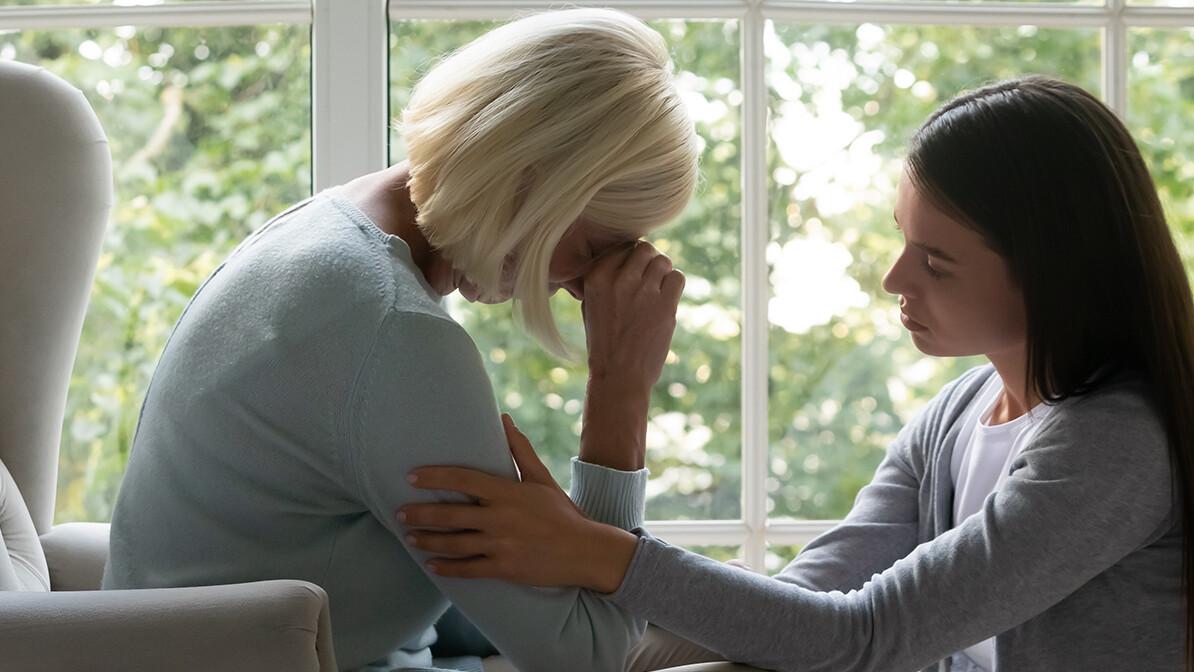- Home
- Relationships
- Surviving a Spouse: How You Can Help

Surviving a Spouse: How You Can Help
Marjorie sat at the table staring at the kitchen door. The clock chimed five times and silence wrapped around her and squeezed. For the last forty years, Gerald had come through that door at precisely ten after five. She could count on it. But today, like every day for the last two months, she knew that familiar slam of the door would not come. In fact, it would never come again.
According to several studies, more than three-quarters of a million people lose their spouses each year. Like Marjorie, they now have to face every day and every night alone. Life’s good-byes are painful.
A surviving spouse doesn’t have any idea what he or she needs. His or her life has been turned upside down and it feels like nothing will ever be the same.
And it won’t.
But with a little understanding and a lot of sensitivity, we can reach out to those around us who have had to say an earthly goodbye to their mates.
When we know someone who is grieving, we want to help but we don’t want to intrude on private, family moments. Grieving is something that cannot be done for someone else. But the journey through grief is not something that has to be done alone. So how can we help those around us who are hurting from a loss?
Finding Yourself Suddenly Single Again
“Personally,” says Susan, a young widow of eight years, “my heart was married for a very long time after my husband was gone and I wanted only to be a couple again. There’s no easy answer but to cling with all your heart to Jesus. It doesn’t mean you won’t make mistakes – but you’ll learn and grow and come out ahead in time.”
She continues, “I met Jason when I was young, seventeen. We married when I was twenty. So in many respects, I’d never been single. I didn’t understand the true single life because we dated all through college and got married. I had to learn it for the first time after marriage which was very confusing. It’s been eight years, and only now do I have an appreciation and love for singleness.”
Bill and his wife, Marianne, were married for forty-six years. “Becoming single after so long was very scary. I couldn’t even find my socks. There were so many little things she did that I wasn’t aware of.”
“I found that I had to make a whole new set of friends,” says Pat. “When I was ready to get out, I volunteered for things such as Hospice, the library, and the church nursery. Volunteer work became a way I could connect with other people in a non-threatening place.”
Left with four young children, Kathy didn’t have much time to think about herself when her husband committed suicide. “Having children at home, I didn’t have time to think about myself. They needed me and suddenly I had to be two parents rolled into one.
“I had to take one day at a time,” she says. “Then one week, then one month. I knew I would never get over my husband’s death but I knew that with God’s help I could get through it.”
Changing Relationships
Marjorie and Gerald had many good friends. Marjorie’s circle group was close and often went out to lunch together. Living on the same street for many years, their neighbors always looked out for one another. And even though they didn’t socialize much, there was a definite bond between them.
After Gerald died, Marjorie thought her friends would still be her friends. But she didn’t know what to say to them and they were uncomfortable around her, knowing of the gap in her life.
“In many ways, we live in a couple’s world,” says Kathy, “even at church. It has taken me almost fifteen years to feel comfortable going to activities by myself.”
Susan says, “My husband and I used to entertain other couples. I don’t entertain like I used to but I’ve come to peace with my new lifestyle. When I can, I invite other single friends over who probably need as much encouragement as I do.”
“Before your spouse dies, you are a couple,” says Jim, a widower of eleven years, “and then you are just sort of a left shoe! You don’t really fit in anywhere.”
Even roles within the family change, sometimes drastically. And, at a time when family members should bring the most comfort, often just being together makes the absence of a loved one even more pronounced.
“When my wife died,” says Robert, “the most painful place to be was with my children. They looked like Sybil, some of them acted like Sybil, and there were pictures of her all around us. For a while, I stopped accepting dinner invitations from my children and their families to avoid the pain.”
Dealing with Changed Relationships
When someone’s spouse dies, we are afraid we might say or do the wrong thing. But there is no correct thing to say. Just be there and be patient. If there are small children still in the home, there will be many practical ways to help. Ask what you can do.
Family members of all generations suffer because of loss. But friendships are not exempt from change either. How can an individual deal effectively with the changes in friendships?
Brenda and her husband were very active in their church, teaching Sunday School together and ministering side by side. “I wanted to continue attending our church. It was such a comfortable place for me. But after Brett died, I found that I needed a new start and that included changing churches. I found a church with a large women’s ministry and wonderful Bible Study groups. Those ladies drew me into their fellowship and gave me a place to feel safe.”
When Brenda first attended her new church, three ladies made a special effort to invite her out for coffee once a week.
“It was a simple outing,” says Brenda, “but it gave me a safe place to try my solo social skills. They never brought up the subject of my husband’s death. If I wanted to talk about Brett, they were fine doing that. But it was my choice. The neat thing is that in the beginning, it was my own personal support group. But as time went by, our roles changed and we began to support one another in whatever way was needed. That friendship is a treasure.”
Bill had a similar experience. “When Marianne was sick, I often slipped out early in the morning while she was still asleep to go get a biscuit by myself. A gentleman from my church was often at the same restaurant. We’d say a superficial ‘hello’ and that was it.
“After Marianne died, that fellow called and invited me to go out to breakfast, same time, same restaurant. He never brought up the subject of my being alone. If I wanted to talk about it, however, he listened. That was ten years ago and we still meet for breakfast every Friday morning!”
Susan’s children were just nine and six when her husband died of a brain aneurysm. She suggests, “Mow the lawn, fix a leak, bring food. Certainly, the most practical way to help is to identify physical needs and meet them. When men recognize household needs and take care of things I can’t, it means a lot. I love pointing out to my children how God has taken care of us even though Daddy is in heaven.”
Pat was left with a totally empty house when her husband died. “For someone to remember you are alone helps a lot,” she says, “especially during the evenings. It’s always nice for someone to invite you to go out to eat or shop with them.”
When Liz became a widow, her concern was also with her two small children. “One of my neighbors recognized how hard weekends were for me. She invited us over for dinner and her husband played with my children. It was such a blessing for them to get to spend time with a man who enjoyed their company.”
As Christians, we have the assurance that we will be reunited with our loved ones in heaven. However, it is difficult to be the one left behind. There are couples everywhere you look – at church, in the store, at work, next door. But when we face the death of a spouse, there will be someone who will be there to reach out with God’s arms of comfort and remind us that we can trust in the One who has plans to prosper us and not to harm us, plans to give us hope and a future. (Jeremiah 29:11).
How can you help?
- Acknowledge the loss. Allow friends to talk about loved ones who have died. Or, allow them the freedom not to talk if they don’t want to.
- Call to say you care. Even if no one answers the telephone, leave a message. “Just thinking of you” or “I’m praying for you” can brighten someone’s day.
- Do practical things. Offer to pay bills, pick up the laundry. Feed the dog. Carpool the kids. Mow the lawn. Be available.
- Remember any special days coming up. Birthdays of family members, anniversaries, school plays or end-of-the-year programs.
- Help decorate the first Christmas.
- Encourage journaling. A journal will provide a way for the surviving spouse to hear God’s voice and see God’s hand through this journey.
- Offer a touch or a hug. Words are not always necessary.
Order your copy of LINKED: Quick Guide to Personalities by Linda Gilden.
Trending Now
Sign up today for your Inspiration Today Daily Newsletter
Supercharge your faith and ignite your spirit. Find hope in God’s word. Receive your Inspiration Today newsletter now!
Linda Gilden
Linda Gilden is an award-winning writer, speaker, editor, writing coach, and personality consultant. Author of Articles, Articles, Articles!, the LINKED Quick Guides to Personalities series, and over a thousand magazine articles, Linda loves to share a great story almost as much as she loves playing with her grandchildren! Learn more at lindagilden.com
Related Articles
June 27, 2025
Who Is My Neighbor: Bridging the Gap Between Emancipation and Equality (Part 2)
In “Who Is My Neighbor: Bridging the Gap,” we ask what it means to truly see, hear, and love our…
June 24, 2025
It’s All About Love
This excerpt explores the beauty of God’s design for marriage, showing how Scripture reflects His…
June 10, 2025
Freedom in Forgiveness
This excerpt explores the healing process and power of forgiveness in marriage, emphasizing how it…
June 2, 2025
The Mystery of Marriage
This excerpt explores the mystery of marriage as a divine reflection of Christ’s love for the…
Next Steps To Strengthen Your Walk
Inspiration Today Newsletter
Supercharge your faith and ignite your spirit. Find hope in God’s word. Receive your Inspiration Today newsletter now!
Christian Articles
Find articles to strengthen your walk and grow your faith. We have a wide range of topics and authors for you.
Submit A Prayer Request
We are here for you. Simply click on the button below to reach us by form, email or phone. Together we will lift our hearts and voices with you in prayer.





